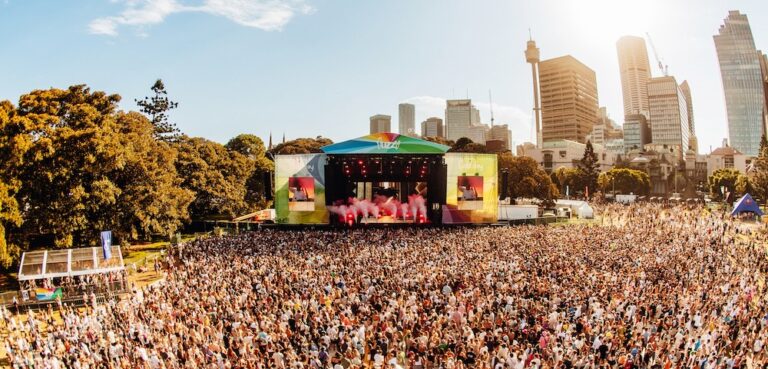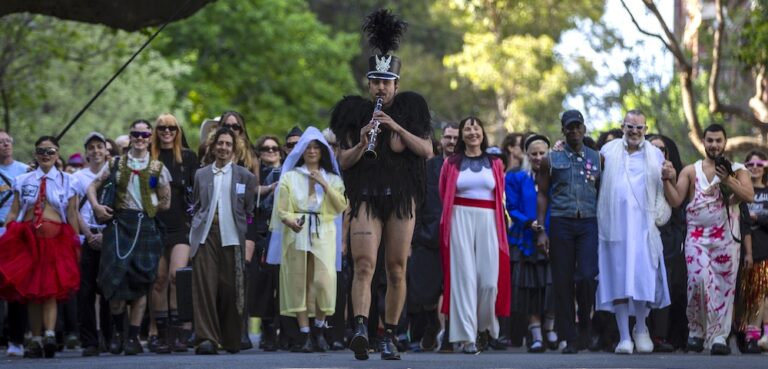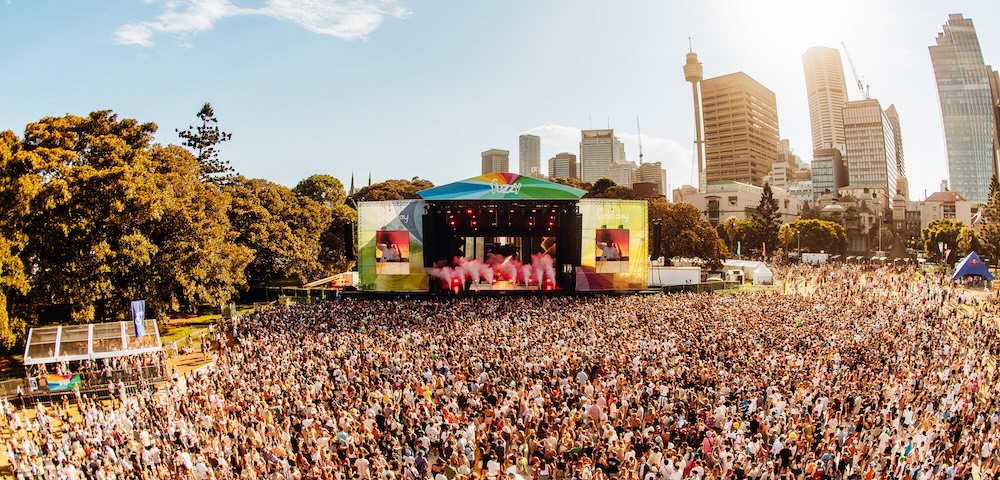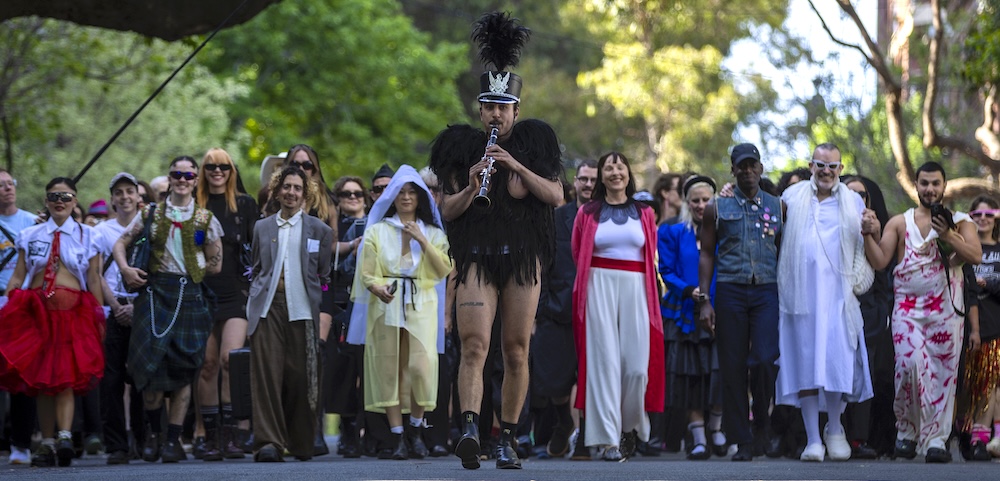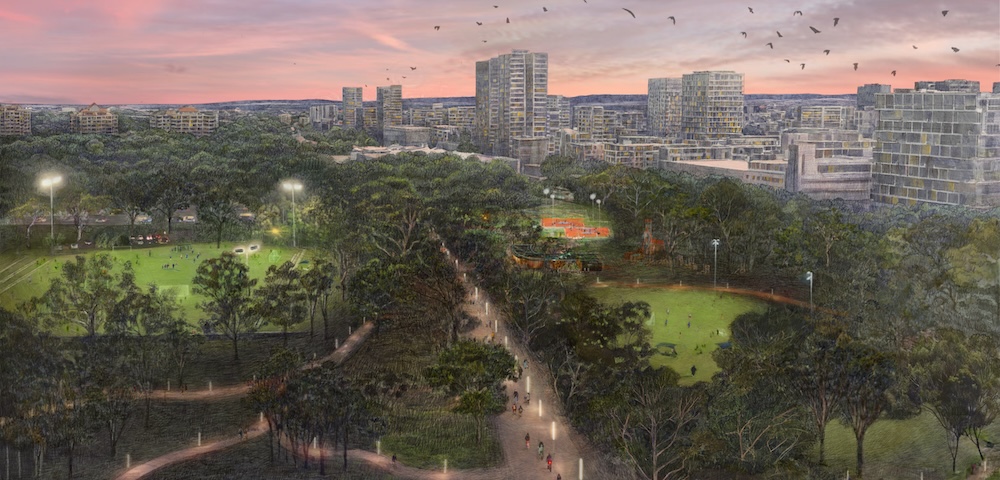
Kings Cross faces uncertain future
Opinion by ANDREW WOODHOUSE
Kings Cross is under attack. Its eccentricity is threatened by the very thing that keeps it alive: a living breathing critical mass and ribbon of funky people and things who don’t mind being deliberately different.
It’s defending itself from volleys of large development applications that, if approved, would erode its individuality, the very thing that makes the cross unique. Its role as a destination is being defeated. After all, as Gertrude Stein, American commentator, remarks, there is no point going there if there is no “there” there.
So locals are digging in like marines at Dunkirk under bombardments and strafing. They fought off the avaricious Bourbon DA which would have seen the famous three white arches reduced to rubble for another mega-bar. Facing a whole new set of council development rules, the developer is now returning with a new DA. City Hub has seen the artist’s impression in advance of lodgement. It shows the arches saved but other sections appear irreconcilable with planning rules which prohibit site amalgamation and require compatibility with the street and urban context.
A battle might have been won but the war continues.
Meanwhile street talk says that Theo Onesferou, developer, want to add another storey to the Astoria Hotel at 9 Darlinghurst Road.
And opposite McDonald’s is the gracious but unusual Art Deco former Commonwealth Bank building at 42 Darlinghurst Road, now proposed for partial demolition and a 40-room hostel and mega bar open to the street capable of accommodating up to 400 patrons per night. 25% of rooms are only 10 square metres. The seven-storey $7.5 million DA has allegedly over 80 height and design breaches. It will be partly clad in black steel, and look like a Bunnings garden shed or a stealth bomber.
Its original quaint brass night safe deposit box in the ground floor façade will remain either as a tokenistic gesture or because its reinforced concrete plinth is too expensive to remove.
This asymmetrical Art Deco gem was constructed in 1940 with a basement and a later addition on its northern side fronting Darlinghurst Road constructed in 1978. It incorporates a highly distinctive landmark tower, a feature in the streetscape and now under threat.
A 1941 article in Building magazine showcases this “pocket” bank, designed by government architects in the Department of the Interior: its entrance and tower form the same shape of man’s suit coat pocket, three times a tall as it is wide. In 1996 the Commonwealth Bank was fully privatised and the site eventually became The Bank Hotel.
The developer admits it has heritage significance and that “the configuration and appearance of the former CBA building have been substantially maintained to present day.”
It has now been recommended for heritage listing by residents which may hiccup any rushed decision.
And just when it may have been all quiet on the north western front, along comes a new, unelected, self-appointed group calling itself the Committee for Sydney. Their declared aims are for a “Plan for a growing population in a way that improves quality of life for all”. Their goals include “Density done well. Creating denser communities with more amenities and connectivity, focusing growth around Sydney’s growing mass transport network.”
Isn’t KX already dense enough? There are over 1,000 residents living within 100 metres of the heritage-listed railway station. Locals scamper down into its hole-in-the street entrance in the morning like wombats and re-appear after work rushing home like salmon swimming upstream to spawn.
The problem with KX is not the amount of people per se but the quality of the infrastructure serving it. After all, KX is not even a suburb. Some say it’s an attitude but it is a small 500 metre strip within another suburb, Potts Point, and includes Darlinghurst Road and a few streets either side.
After sucking a $40,000 grant from Sydney Council to create a “collaborative” approach to redesigning Kings Cross the Committee for Sydney intends to have something to present to council by the end of the year. But does it have a mortgage on mentality?
And who are they? They say “Our members include major companies, universities, not-for-profits, local and state government departments and key cultural, sporting and marketing bodies. We represent no one sector or interest but we share one passion: Sydney and the role it plays as Australia’s global city.” Ummm.
Its CEO, Greg Metcalfe, states “The Committee for Sydney is a research and advocacy organisation that works with leaders across Sydney to solve the problems of today and tomorrow.”
Its 16-person board consists of a lawyer and company director recently awarded a plum state government job in charge of parklands, Michael Rose. He is described in City Hub recently* as “a businessman who will chair the GSP (Greater Sydney Parklands) board. He also chairs the North West Rapid Transit Group, the pro-development lobby Committee for Sydney and is a trustee of the Sydney Harbour Trust. An ex-partner of one of Australia’s most powerful corporate law firms Allens, he has been an advisor to consulting giant KPMG.” *
The Committee for Sydney ‘s board includes two lawyers, an accountant and wealth manager, an academic, the Chair of Sydney Council’s smart cities task force, a real estate agent, two more accountants one of whom is a tourism advisor, the former chief of staff for Gladys Berejiklian, a Lendlease property developer, a building engineer and designer, a commercial improvement representative, a banker, a former political advisor to the Greiner liberal government, a communications consultant and a Newscorp executive.
With all this abacus-driven mentality there is not one heritage, social impact or traffic expert. None live in our area as far as we know.
James Hulme, Director of Advocacy for the committee, claims it has a track record of successful projects such as a research report on revitalising Sydney’s high streets, a 2016 report on the Western Harbour precinct and ongoing works regenerating Parramatta Road.
He told City Hub “We work on projects that incorporate areas from across Greater Sydney – for example we are about to release a paper on Parramatta … I hope we can cultivate some interesting ideas on how it might be enhanced … we have no formal connection to the alcohol industry. We publish the names of our members in complete transparency. We recognise that the hospitality industry plays in important role in Sydney’s economy and society, but our membership is cross-sectoral.”
He adds “We are still in the early stages of planning the project framework, but will be looking at the Metro site as part of our research. Kings Cross has a rich cultural heritage and we will explore how its existing assets might be utilised more effectively. Our final report will contain recommendations for state and local government, but we are at the early stages of the project and aren’t in a position to be specific on funding. Kings Cross is one of the most iconic and internationally renowned areas of Sydney, with a very rich history and heritage and is much loved by residents and Sydneysiders.
That said, it’s fair to say that the area does have some reputational issues, so this project will look at how to make some improvements to the area and articulate a positive vision for its future.
We will be working with the local community, with the City of Sydney, with local businesses and others to put some ideas on the table of what that vision might look like.”
However, its media releases support the winding back of life-saving lockout laws.
Sydney Council Councillor, Professor Kerryn Phelps AM, a local resident and GP, says “I will be watching their recommendations closely to make sure that there is not a disproportionate emphasis on the liquor industry as the basis of commercial revival or alcohol as entertainment.
“In March 2018, when the [Metro] property was on sale, Council rejected a motion that had been put up which requested the CEO to begin negotiations over the possible acquisition of the Metro Theatre for its adaptive re-use as a theatre, film or cultural facility.
“I have put up two motions since then, one which requested the heritage listing of the theatre, and one which called for the investigation of the business case for future use of the theatre as an entertainment and cultural facility and to begin discussions with the NSW Government to explore a possible public-private partnership of the site. All of these have been rejected.
“Both of these motions have also been rejected in favour of vaguely-worded commitments by the Council to “address the shortage of theatres and performance spaces within the City of Sydney and support the continued growth of the eastern edge of the city as a theatre precinct.”
“I don’t believe the Council is intending to purchase the former Metro theatre, or is willing to make the guaranteed commitment to transform the space into a community arts centre or theatre. I would hope that the State government might come to the party and consider acquiring the Metro as part of a broader plan for Potts Point and Kings Cross as a vibrant entertainment precinct.”
“Residents are a crucial part of the Kings Cross and Potts Point areas, however the Council has a known track record of disregarding the strongly held views of local communities and residents during developments and upgrades.
“During the Council discussions on this [$40,000] grant, I spoke about the apparent exclusion of residents from a central partnership in the consultations about the future of our area. Revitalisation is in everyone’s interest, but the amenity and quality of life of the residents in this densely populated area should be foremost in any consideration of the future
“To truly achieve the new ‘vision’ for Kings Cross as a safer, and more attractive area to both the residents and visitors, there needs to be true collaboration between the Council, NSW Government, local businesses, the cultural sector and residents.
“I would hope that the Committee for Sydney report is just one piece of the consultation process on the future of the area contributing to a precinct vision that is mindful of the priorities of residents, businesses and visitors in our community.”
It may be a cliché but Kings Cross really is at the cross roads, looking in the rear vision mirror to its past and looking forward to an unknown future.
